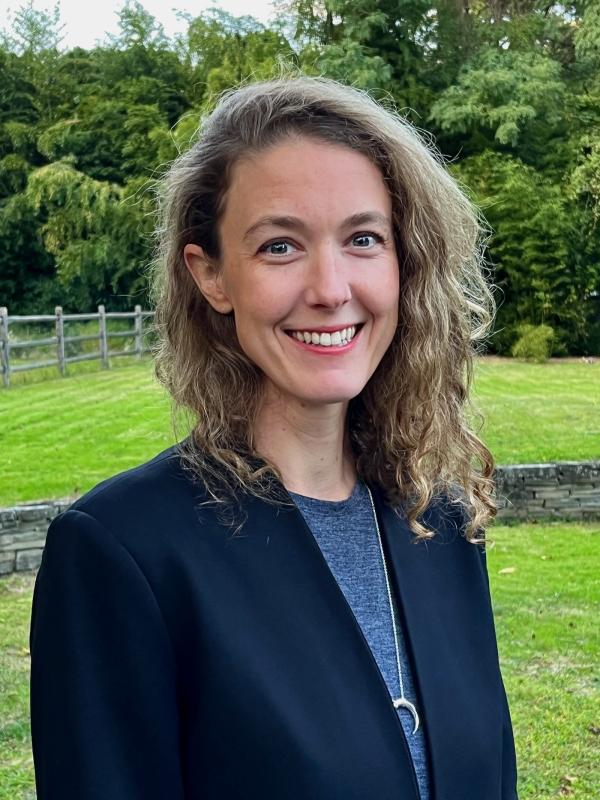Diana B. Greenwald
Associate Professor
Building
North Academic Center
Office
4/138C
Phone
212-650-6435
Website

Diana B. Greenwald
Profile
Diana B. Greenwald's research focuses on the politics of the Middle East, nationalism, conflict, and state-building. She obtained her Ph.D. in political science from the University of Michigan in 2017. From 2017-8, she was Postdoctoral Research Fellow at the Middle East Initiative at the Harvard Kennedy School. Her book, Mayors in the Middle: Indirect Rule and Local Government in Occupied Palestine (Columbia University Press 2024) examines Palestinian local politics under Israeli occupation. This project draws on interviews with municipal leaders and local data on policing, taxing, and spending collected in the West Bank between 2014 to 2019.
Greenwald's research has been published in PS: Political Science & Politics, Middle East Law and Governance, and Civil Wars. Her writing has also appeared in The National Interest, The Washington Post's Monkey Cage, +972 Magazine, and Foreign Policy. Her work has been supported by RFCUNY, the United States Institute of Peace, the Rackham Graduate School at the University of Michigan, and the Project on Middle East Political Science.
Courses Taught
PSC 10300: Introduction to World Politics
PSC 23900: Political Systems of the Middle East
PSC 30500: Political Economy of Development
PSC 32600: Nationalism, Identity, and Ethnic Conflict
IR B6927: (Comparative and) International Political Economy
Publications
Greenwald, Diana B. 2024. Mayors in the Middle: Indirect Rule and Local Government in Occupied Palestine. New York: Columbia University Press.
Greenwald, Diana B. 2023. "Delegating Domination: Indirect Rule in the West Bank." In The One State Reality: What Is Israel/Palestine?". Eds. Michael Barnett, and Nathan Brown, Marc Lynch, and Shibley Telhami. Ithaca: Cornell University Press.
Greenwald, Diana B. and Mark Tessler. 2022. "After the Uprising: The Intifada-Oslo Generation and Attitudes toward the Palestinian Police Force." Middle East Law and Governance 14(3): 388-413.
Cancian, Matthew and Diana B. Greenwald. 2022. "Infrastructure, Revenue, and Services: Non-State Governance in Iraq's Disputed Territories." Civil Wars 24(4): 445-496.
Greenwald, Diana B. "Does Israel-Palestine need any 'state' solution?" +972 Magazine. 28 Jul. 2021. Available: https://www.972mag.com/regime-change-israel-palestine/.
Abrahams, Alexei and Diana B. Greenwald. Geospatial Research in Settings of Contested Sovereignty." APSA MENA Politics Newsletter. Spring 2021. Available: https://apsamena.org/mena-politics-newsletter-41-spring-2021/.
Greenwald, Diana B. "Military Rule in the West Bank." Project on Middle East Political Science Studies 41. Jul. 2020. 31-36. Available: https://pomeps.org/pomeps-studies-41-israel-palestine-exploring-a-one-state-reality.
Greenwald, Diana B. 2019. "Political Science Research in Settings of Intractable Conflict." PS: Political Science & Politics 52(3): 498-502. https://doi.org/10.1017/S1049096519000234.
Greenwald, Diana B. "Who is responsible for solving Gaza's massive electricity crisis?" The Washington Post Monkey Cage. 5 Feb. 2018. Available: https://www.washingtonpost.com/news/monkey-cage/wp/2018/02/05/who-is-responsible-for-solving-gazas-massive-electricity-crisis/.
Greenwald, Diana B. "Before Deciding Who Rules Jerusalem, Decide What Jerusalem Is." The National Interest. 6 Dec. 2017. Available: http://nationalinterest.org/feature/before-deciding-who-rules-jerusalem-decide-what-jerusalem-23523.
Greenwald, Diana B. and Mark Tessler. "Palestinians don't trust institutions. What that means for peace 50 years after the Arab-Israeli War." The Washington Post Monkey Cage. 8 Jun. 2017. Available: https://www.washingtonpost.com/news/monkey-cage/wp/2017/06/08/palestinians-dont-trust-institutions-what-that-means-for-peace-50-years-after-the-arab-israeli-war/.
Greenwald, Diana B. "Next month's Palestinian local elections aren't happening. Here's why." The Washington Post Monkey Cage. 20 Sep. 2016. Available: https://www.washingtonpost.com/news/monkey-cage/wp/2016/09/20/palestinian-local-elections-were-postponed-heres-why-pa-leaders-may-feel-threatened/.
Greenwald, Diana and Samantha Constant. 2015. "The Context for Social Entrepreneurship in the Middle East." In Social Entrepreneurship in the Middle East. Eds. Dima Jamali and Alessandro Lanteri. London: Palgrave MacMillan.
Greenwald, Diana. "The Palestinian Fiscal Crisis." Foreign Policy. 16 Jan. 2013. Available: http://foreignpolicy.com/2013/01/16/the-palestinian-fiscal-crisis.